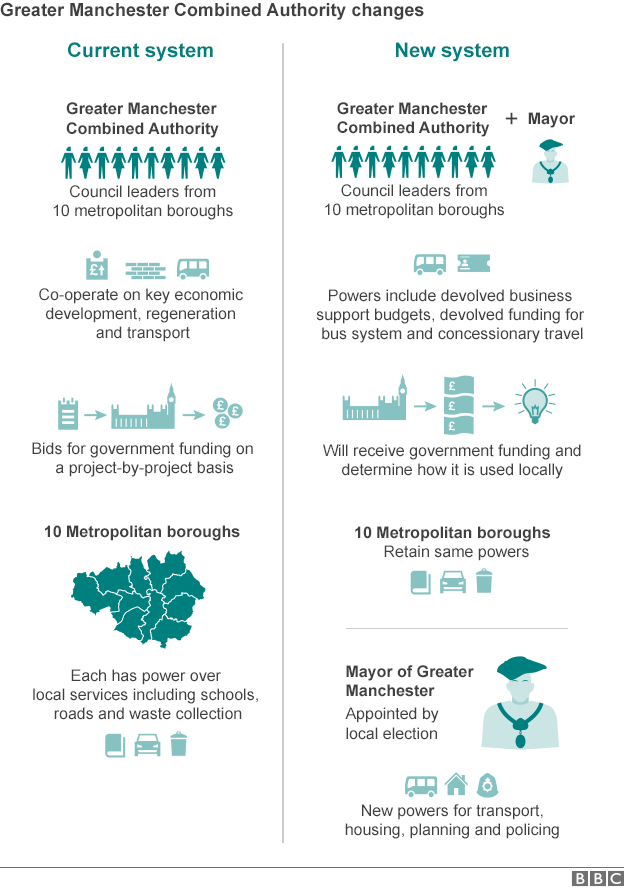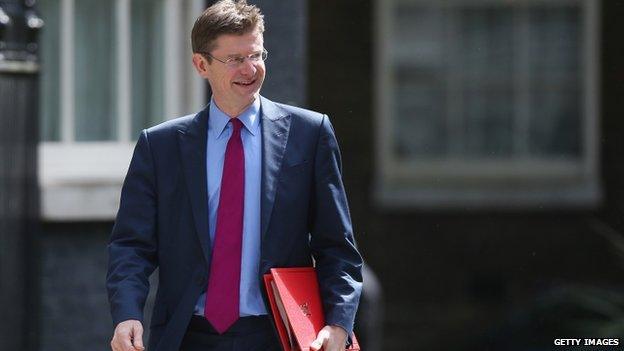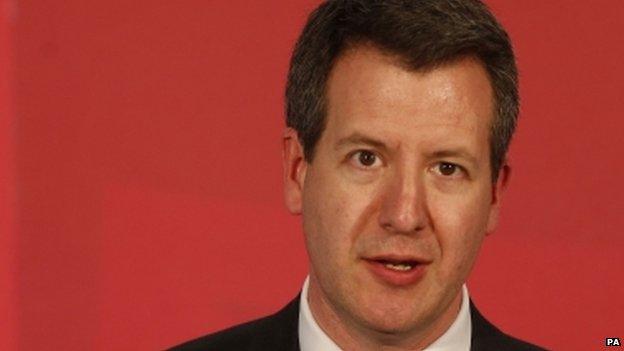George Osborne outlines city devolution plan for England
- Published
- comments
George Osborne: "It is time for you to take control of your own affairs"
English cities will get powers over housing, transport, planning and policing under plans set out in George Osborne's first post-election speech.
Greater Manchester - which will take on the powers when electing a mayor in two years - should become a blueprint for other large cities, he said.
A Cities Devolution Bill will be in the Queen's Speech later this month.
Labour claimed the government's "piecemeal approach" could mask big cuts to local councils' spending.
BBC assistant political editor Norman Smith said the chancellor hoped the move would "reignite" areas such as Manchester, not just economically but also to renew a sense of civic pride.
But it is also designed to "wrong foot" Labour in their northern heartlands, and to "re-present" the Tories in the north where they have traditionally been "on the back foot", he added.
'Revolution in government'
Speaking in Manchester, the chancellor said the "old model" of running everything from London was "broken" and had unbalanced the economy.
He said it has "made people feel remote from the decisions that affect their lives", and added: "It's not good for our prosperity or our democracy."
Mr Osborne stressed that the government would deliver the devolution to Scotland and Wales it promised.
But he said he wanted to go much further and "deliver radical devolution to the great cities of England" and give them the "levers to grow their local economy".


As part of the devolution plan, only cities that elected their own mayor would be given control of local transport, housing and skills.
"I will not impose this model on anyone," Mr Osborne said, "but nor will I settle for less."
"My door now is open to any other major city who wants to take this bold step into the future."
This is a "revolution in the way we govern England", said.
Last year, leaders of Greater Manchester's 10 councils agreed to the area's first mayoral election, described by Mr Osborne at the time as "a massive moment for the north of England".
The move came two years after the people in Manchester had voted against having a mayor for the city alone.
'Right approach'
Under the devolution plans, the mayor would lead Greater Manchester Combined Authority, chair its meetings and allocate responsibilities to a cabinet made up of the leaders of each of the 10 councils.
Councils in Greater Manchester currently control about £5bn of public money each year.
This deal is expected to give them control over a further £2bn.
Other cities will be able to follow suit in future, if they choose.
Mr Osborne also announced that former Goldman Sachs chief economist Jim O'Neill would become the commercial secretary to the Treasury, tasked with helping the government to boost infrastructure and devolve more power to English cities.

Mr Clark said he believed the changes would put more power in the hands of local people
Greg Clark, the new communities and local government secretary, told BBC Radio 5 Live that many cities could benefit.
"These decisions - about Hull, and about Manchester, and about Leeds, and about Newcastle, and about Birmingham - should be made by the people of those great cities, who know and love their area, rather than having to troop up to London and plead for crumbs from the table.
"That is absolutely the right approach and that's exactly what we're doing. So rather than it being a new layer of government, what it's doing is taking from central government and putting it in the hands of local people," he said.
Regional differences?
However, local government expert Professor Tony Travers told the same programme that not all cities would welcome the move.
He said: "It's going to be a condition that they accept a directly elected mayor - and that of course is not popular with the leaderships of many of the cities concerned.
"Greater Manchester has agreed to do this. But other cities will now have to decide if they're prepared to accept a city-regional or city-area mayor, in exchange for getting these extra powers and resources."
The Labour leader of Manchester City Council, Sir Richard Leese, has worked with Mr Osborne on the plans, but the government could meet resistance to the idea in Leeds, Newcastle and other cities.
Newcastle City Council's leader Nick Forbes has warned the chancellor that the city would not be a "pushover" if it was expected to accept an elected mayor as the price for the north-east England receiving more power.
"We are certainly not just going to take the first offer the government make to us, we have got to do what's right for our region," said the Labour politician.
In Liverpool, the city's elected mayor Joe Anderson - also Labour - has expressed frustration that Merseyside has not been to claim the sort of powers being devolved to Manchester because other local authority leaders in the area have not come on board.

Mr Leslie said the poorest communities have been hit hardest by local authority budget cuts
Commenting on the plans, Labour shadow chancellor Chris Leslie said: "We know that particularly across the north of England they've been hit very very hard by this chancellor in the past. And a piecemeal approach to devolution that is actually masking a different agenda isn't something that I think they would be looking forward to".
Creating a so-called Northern Powerhouse, aimed at closing the economic gap between north and south, would bring more than £18bn to the region by 2030 Mr Osborne has predicted.
The chancellor's speech follows the Conservatives' surprise outright win in last week's general election.
Labour has previously argued for £30bn of spending responsibilities to be devolved to the English regions to boost economic growth, while leaders of councils in the Midlands have expressed concern about their regions missing out on funding.

GVA measures the contribution to the economy of each individual producer, industry or sector in the UK
Greater Manchester includes Bolton, Bury, Oldham, Rochdale, Stockport, Tameside, Trafford, Wigan, and the cities of Manchester and Salford
Tyneside comprises Newcastle upon Tyne, Gateshead, North Tyneside and South Tyneside local authorities
Source: ONS